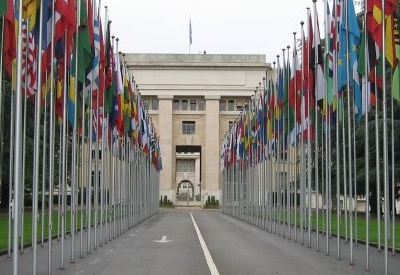Collective security, COVID 19, and China's influence
Keywords: COVID - 19 John Maynard Keynes South China Sea Joe Biden Xi Jinping
vaccine - diplomacy hostage - diplomacy
ABSTRACT
The advent of the COVID 19 pandemic has spawned an industry unto itself. While discussion in EU circles centred around the fallout of BREXIT, and Washington's trade deal with China, the pandemic and access to a vaccine has illuminated the disparity between have and have not nation states. Failed states such as Myanmar and Somalia face difficulty in acquiring a vaccine due to economic viability and a lack of credibility as a legitimate state adhering to the international rules based order. Myanmar's military is now in charge after a coup ousted recently elected leader Aung San Suu Kyi. Her two victories to spur a democratic movement appear to have gone for naught with a military junta now in charge and as can be expected, a limited supply of vaccines being available able to select groups in this country of 54 million people. Canada has seen a disparity among health care workers owing to restrictions among employment locations due to social distancing. In one instance a woman could not afford the rent on her apartment that was due in part to workplace social distancing guidelines and minimal benefits for part time workers.
Chinese officials are meeting American members of the Biden administration this week (March 18) to attempt to salve relations. At the centre of the discussion will be human rights issue involving Uygurs in Xinjiang and Tibet, political malfeasance in Hong Kong, and continued threats towards Taiwan. In addition, China's foray into South and Central America through port deals, illegal fishing, and "vaccine diplomacy" is sure to receive attention, as well as "hostage - diplomacy" regarding the arbitrary detentions of two Canadians - Michael Kovrig and Michael Spavor by Chinese officials in retaliation for the arrest of Huawei executive Meng Wanzhou on an arrest warrant by American officials. Chinese officials insulted America in Anchorage, while American officials sat and tolerated the onslaught. U.S. officials including Secretary of State Blinken should have left the meeting at that point. The inaction by Biden officials sheds light on Hunter Biden's affiliation with China. One thing is certain, former Secretary of State - Mike Pompeo would never tolerated Chinese officials shenanigans. Not a proud moment for America.
China's rise coupled with COVID
Intentionally or not, China has found a cleavage within COVID 19 and is seeking to escalate its interests, while advancing its goal as the leading international economy, military, and champion of democratic institutions, such as UN member organizations.
Some scholars might surmise that China was "laying in the weeds" waiting for this opportunity, created this designer virus, or is simply maximizing this opportunity, while advancing trade opportunities such as the EU trade agreement that empowers Chinese companies to invest in EU markets.The EU shifted to a pan China agreement with the spectre of Donald Trump running for President in the next U.S. election with EU members still affected by Trump's tariffs.
Politically, the central government is cloaking the situation on the ground with Tibet, Xinjiang, Hong Kong and Taiwan through denial and rhetoric, leaving factual information managed through authorities that challenge every criticism as untrue and innuendos, that ultimately advance the economic, territorial, and natural resource interests of the CPC; Taiwan has the semiconductor supply cordoned off as the top global supplier. Chinese tech needs to bolster its needs on the mainland, providing a two fold reason for capturing Taiwan: 1) consolidate its goal of a One China policy by occupying and controlling Hong Kong, Taiwan, and neighbours making it the juggernaut in the Indo Pacific with the goal of controlling the trade routes in the South China Sea. In this sense, thee central government's aim is to advance the replica of a Silk Road to bolster Xi's signature policy BRI (Belt & Road Initiative) through "Debt Diplomacy" through, Africa, Europe, and Asia where the CPC can extend its influence among those regions where it holds financial sway through loans for infrastructure. The U.S. is in perilous position to compete because of financial implications due to the pandemic and mammoth deficits to combat economic constraints to private sector and citizens.
Is there an antidote to CPC influence?
The Biden Administration is returning to collaboration with multi lateral institutions such as WHO, CDC, etc. to manage crisis and usurp Beijing influence. U.S. State Department Spokesperson Ned Price confirmed this shift awards allies and partners to counter China's rise in the Into Pacific. Biden's team is working to re-invigorate the JCPOA (Joint Comprehensive Plan of Action) to contain Iran's nuclear ambitions, and will return to the The Paris Agreement on climate signed in 2016 by 196 nation states. Beijing and Russia will always support states ideologically in the UN Security Council P5 and with that collusion and influence in SE Asia should be viewed as twins through foreign policy endeavours. Russia may support America's expanded role as their influence is being eroded by China's impact in SE Asia and Central Asia where China is attempting to make inroads into 1) Russia controlled territory in the city of Vladivostok, and on the LAC (Line of Control) with India, 2)maintaining and expanding SINO influence in Tibet contributing to cultural and suppression of human rights, forced labour 3) genocide of the Uyghur population in Xinjiang 4) the curtailing of freedoms on Hongkongers with the passage of the national security law in 2020 5) the almost daily threats to Taiwans sovereignty and democracy with sorties carried out by the PLAAF (Peoples Liberation Army Air Force) with nuclear capable bombers that is straining Taiwan's defences in combatting the central governments goal of a veiled peaceful surrender to "reunify" the mainland with Taiwan, 6) the restrictions imposed on Hongkongers in accepting Britain's offer of citizenship apart from a Hong Kong that is increasingly becoming mainlandized in the wake of recent protests on the Hong Kong peninsula. China will no longer recognize the BNO passport... “From January 31, China will no longer recognize the so-called BNO passport as a travel document and ID document, and reserves the right to take further actions,” foreign ministry spokesman Zhao Lijian told reporters. The Japan Times, January 29, 2021.
The Canadian goverment can look to the detentions of Michael Kovrig and Michael Spavor in a "hostage diplomacy" exchange for the arrest of Huawei executive Meng Wanzhou on an extradition request by American authorities relating to her colluding with Iranian authorities to circumvent American sanctions relating to Iran's nuclear proliferation goals. The Canadian government has not properly addressed the concerns of the Kovrig/Spavor families other than seeking support for their release through the Trump Administration and the international community of those that support a rules-based international order. The Canadian government has options similar to Australia that has faced tariffs of 200% on Australian wine and 80% barley. China is penalizing Australia for summoning an inquiry in China on the origins oil COVID 19. Canada, like Australia can seek other markets for their goods, notably canola, oil that China banned in March 2019. Meng Wanzhou was arrested on Dec.1, 2018. With a trade deficit with China of 51.8 billion CDN in 2019 the Canadian government can impose tariffs on Chinese imports, restrict the number of Chinese students studying in Canada, minimize the presence of Confucius Institutes nationally, while maintaining the Ottawa embassy and a single consulate in Western and Eastern Canada. These are hard options that will guarantee a Chinese response, however, Canada can seek closer ties with there Bidden Administration, forge international trade agreements and alliances opposing China's actions or take these punitive actions.
COVID and Keynes
What can democracies do to manage the situation better on the ground?
I think bolstering their public sector to distribute services is the answer to bridging the disparity in incomes, providing a PIC (Pandemic Industrial Complex) to grow the economy through jobs and benefits in Keynesian fashion. Democrats have a golden opportunity in the U.S. to do this now as they control the executive, House of Representatives, and the Senate. Democrats may face opposition from the Trump clique that is determined to exercise its influence beyond traditional political levers of influence --see Proud Boys, etc., including Wall Street, and the Republican controlled Supreme Court. Economies facing record debt levels not seen since the aftermath of WWII.




